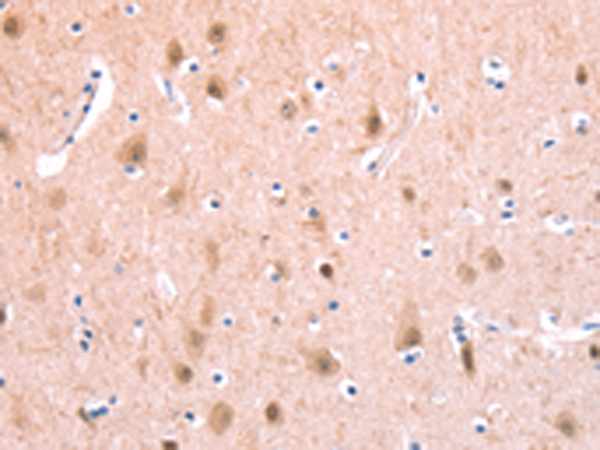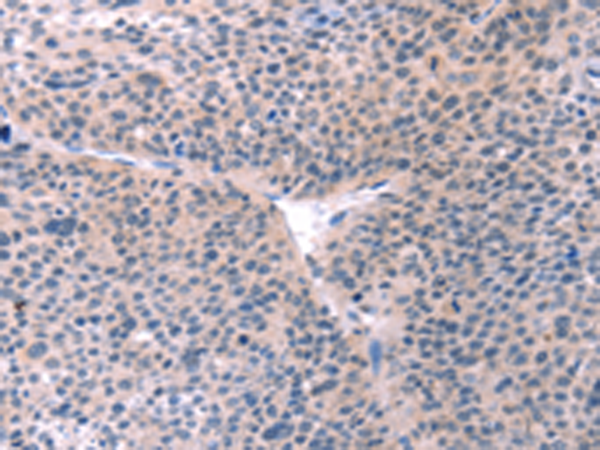

| WB | 咨询技术 | Human,Mouse,Rat |
| IF | 咨询技术 | Human,Mouse,Rat |
| IHC | 1/25-1/100 | Human,Mouse,Rat |
| ICC | 技术咨询 | Human,Mouse,Rat |
| FCM | 咨询技术 | Human,Mouse,Rat |
| Elisa | 1/2000-1/5000 | Human,Mouse,Rat |
| Aliases | BMR2; PPH1; BMPR3; BRK-3; T-ALK; BMPR-II |
| Host/Isotype | Rabbit IgG |
| Antibody Type | Primary antibody |
| Storage | Store at 4°C short term. Aliquot and store at -20°C long term. Avoid freeze/thaw cycles. |
| Species Reactivity | Human, Mouse |
| Immunogen | Fusion protein of human BMPR2 |
| Formulation | Purified antibody in PBS with 0.05% sodium azide and 50% glycerol. |
+ +
以下是关于BMPR2抗体的3篇代表性文献示例(建议通过PubMed或学术数据库核对完整信息):
---
1. **标题**: *"BMPR2 mutations and endothelial dysfunction in pulmonary arterial hypertension"*
**作者**: Morrell NW, et al.
**摘要**: 研究BMPR2基因突变在肺动脉高压(PAH)患者中的致病机制,通过BMPR2抗体检测内皮细胞中受体蛋白表达下降,揭示突变导致BMP/Smad信号通路异常与血管重塑的关系。
---
2. **标题**: *"Antibody-based detection of BMPR2 depletion in heritable pulmonary hypertension"*
**作者**: Atkinson C, et al.
**摘要**: 开发特异性BMPR2抗体用于Western blot和免疫组化,验证遗传性PAH患者组织样本中BMPR2蛋白水平降低,为临床诊断提供分子标志物。
---
3. **标题**: *"BMPR2 antibody modulates TGF-β signaling in vascular smooth muscle cells"*
**作者**: West JD, et al.
**摘要**: 利用BMPR2抗体阻断受体功能,研究其对血管平滑肌细胞中TGF-β与BMP通路交叉调控的影响,揭示BMPR2失活促进细胞增殖的分子机制。
---
**备注**:以上文献标题与作者为示例性质,具体研究请以实际数据库检索结果为准(如PubMed搜索关键词:BMPR2 antibody、pulmonary hypertension)。部分研究可能聚焦于突变分析或信号机制,但均涉及BMPR2抗体的实验应用。
The bone morphogenetic protein receptor type 2 (BMPR2) antibody is a crucial tool for studying the BMPR2 protein, a member of the TGF-β receptor superfamily. BMPR2 plays a vital role in cellular signaling pathways regulating growth, differentiation, and apoptosis. It is particularly significant in pulmonary arterial hypertension (PAH), where mutations or dysregulation of BMPR2 are linked to over 70% of hereditary and ~20% of sporadic cases. The antibody enables detection and quantification of BMPR2 expression in tissues or cells, aiding research into disease mechanisms and therapeutic targets.
BMPR2 antibodies are widely used in techniques like Western blotting, immunohistochemistry, and flow cytometry. They help identify reduced receptor expression or aberrant signaling in PAH models and cancer studies, where BMPR2 dysfunction may influence tumor progression. Recent studies also explore BMPR2's role in vascular remodeling and endothelial cell homeostasis.
Available as monoclonal or polyclonal variants, these antibodies vary in specificity and applications. Validation across species (human, mouse, rat) enhances their utility in translational research. Emerging therapeutic strategies, such as gene therapy or ligand-based interventions targeting BMPR2 pathways, further underscore the antibody's importance in both basic research and clinical diagnostics. Challenges remain in standardizing detection methods and understanding post-translational modifications affecting BMPR2 function.
×